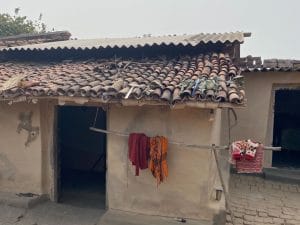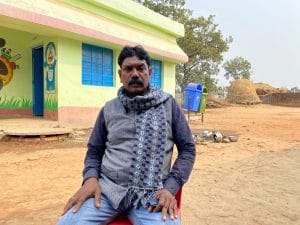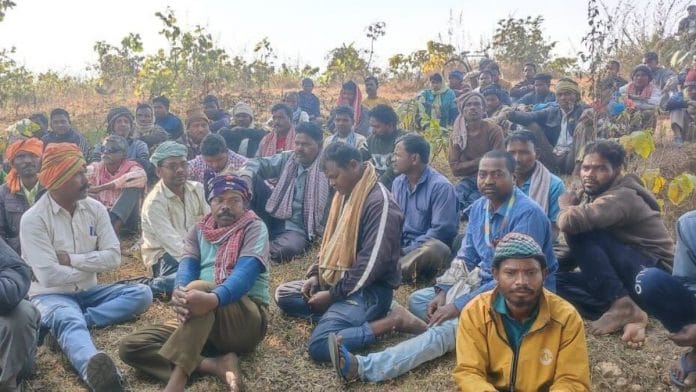The Santhals in Jharkhand are on a new path to reform one of their ancient death rituals. And it all comes down to the 2.5-metre cloth people offer at burials.
About 200 people attended the funeral of 65-year-old Tunda Manjhi, who passed away last month after a prolonged illness in Charhi of Jharkhand’s Hazaribagh district. He was buried on the forest department’s land near his village. What remains today at his grave are ashes from the fire that was set to the huge heap of shrouds people had donated during the last rites.
According to the Santhal tribe’s culture, everyone must bring a 2.5-metre shroud to show respect for the dead. While these shrouds should be buried with the dead, the quantity is so much that people end up burning them near the grave after having spent Rs 50-200 to buy them. This age-old ritual, however, is set to end now.
Last month, hundreds of people from the Santhalcommunity gathered in Kajri Bhurkunda village and decided to change their shroud tradition. In that meeting, they suggested an alternative: Those wanting to pay last respects could either provide financial help to the deceased’s family or bring grains and vegetables to feed the community. A similar resolution was also passed in Hazaribagh, Ramgarh, and Bokaro.
In the Santhal tribe, some families can’t even afford two square meals a day. In Kajari Bhurkunda, many families live in kutcha houses and sleep on floors, which means that the expense of funerals is hard for them to bear. They take out loans and sell precious commodities such as bicycles and fans to meet the costs. Sometimes, when they can’t get financial help from any source, they postpone rituals.
“We haven’t been able to complete my father’s last rites yet. We still have to feed the community, which will cost around Rs 30,000. What I earn is rarely enough to make ends meet. How can we afford this?” says Mahavir Murmu, who makes Rs 200 a day as a daily wage farm labourer.
Also read:
Evolving traditions
Mahavir’s family of five lives in a kutcha house with two small rooms, one ‘chulha’ (clay stove), and an open courtyard. Mahavir’s mother, Mahadevi, sits in the yard with open hair and a blank expression. The grief of losing her husband is evident, but she doesn’t let it cloud her practical judgement. “Now, they have ended the shroud tradition. Families like ours don’t need shrouds; we need financial and social support. I hope this will succeed, and no one will face such difficulties,” says Mahadevi while fixing her blue and orange saree.

“We are not ending these practices; we are only innovating. Educated people understand it, but find it difficult to convince other tribe members,” says Santhal leader Prabhu Murmu, who was a member of that meeting.

The meeting, held in five to six villages, garnered roaring support from community members—particularly the youth. “Although we took the decision, we have to see how many people actually follow this. By changing these traditions, we want to tell society that tribals are evolving,” says Lakhbir Manjhi, a member of the Santhal tribe.
Amid the cackle of children and stray chickens, 20 women crouch on the floor of an Anganwadi centre to discuss juicy details. The decision, after all, has become a hot topic in Kajri Bhurkunda.
“Nobody comes empty-handed. Even if someone donates just Rs 10, it is helpful because there many families whose daily income is only Rs 10,” says Fabiana Tundu, a resident.
Also read:
Spreading the message
The youth, on the other hand, took to social media to announce this landmark decision. They posted photos of the meeting and wrote about it, while the rest spoke to local media.
“When a family struggles with a problem or disease, people do not come forward to help. But when someone dies, they come with a shroud,” says Prabhu Murmu, a community leader who worked toward taking this decision.
There are other responsibilities and expenses too. The deceased’s family has to serve a feast to the entire village, replete with goat meat, rice and sweets. Families often end up taking loans to fulfil these exorbitant expectations.
“I don’t think we will be able to save this much even in the next three years,” says Mahavir.
Nirmala Putul Murmu, an award-winning tribal activist and writer, has captured this sentiment of protest in her poem, Bitiya Murmu Ke Liye:
“Rise up against your darkness
rise up against the conspiracies behind you
Get up, get up from where you are
Like a whirlwind rises from a storm
Rises like a spark buried in the ashes”
Murmu now wants to take these reforms to the next level.
“Girls should get rights in property. Voice should be raised for this too.”
(Edited by Zoya Bhatti)






